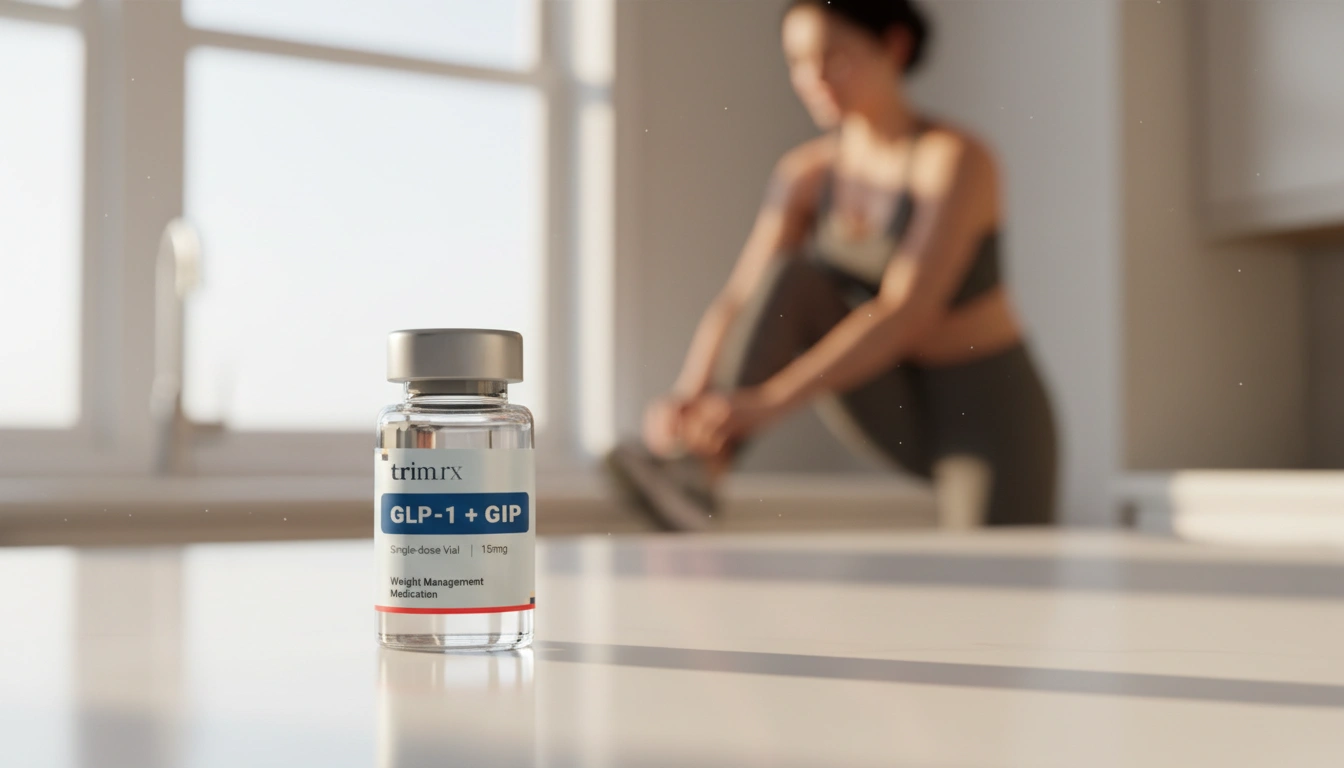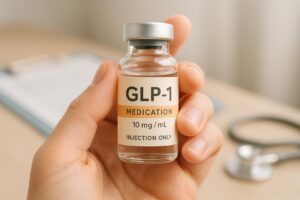Tips and Strategies for Managing GLP-1 Constipation Effectively

Introduction
Constipation can be an uncomfortable and frustrating experience, especially for those who are navigating the complexities of weight loss with GLP-1 (glucagon-like peptide-1) medications. Did you know that nearly one in four individuals taking GLP-1 medications may encounter this pesky side effect? These medications, celebrated for their role in weight management and diabetes control, can lead to gastrointestinal issues, including constipation. As we embark on this journey together, we will explore what helps with GLP-1 constipation, providing you with practical and effective strategies to alleviate discomfort while still benefiting from your treatment.
For many, starting a GLP-1 medication is a significant step towards achieving a healthier lifestyle. These medications work by mimicking a natural hormone in the body that helps regulate appetite and insulin levels, targeting the root causes of weight gain. However, as our bodies adjust to these medications, side effects like constipation can arise. Understanding the mechanisms behind this side effect, as well as actionable steps to combat it, is crucial for maintaining your overall well-being.
In this blog post, we will delve into the reasons behind GLP-1-induced constipation, discuss the dietary and lifestyle changes that can help, and highlight the importance of staying connected with healthcare providers throughout this process. Together, we’ll ensure that your journey towards weight loss is as smooth and comfortable as possible.
Understanding GLP-1 Medications and Their Impact on Digestion
Before we dive into solutions, let’s take a moment to understand what GLP-1 medications are and why they can cause constipation. GLP-1 medications, including popular options like Semaglutide (Ozempic® and Wegovy®) and Tirzepatide (Mounjaro®), have gained attention for their ability to facilitate weight loss and improve glycemic control in individuals with type 2 diabetes. By slowing gastric emptying and enhancing feelings of fullness, these medications help reduce overall caloric intake.
However, the very mechanisms that contribute to their effectiveness can also lead to constipation. Slowed gastric emptying means that food moves through the digestive tract at a reduced pace, which can hinder regular bowel movements and lead to harder, drier stools. As a result, individuals may experience discomfort, bloating, and difficulty passing stool.
It’s important to note that constipation is not solely a result of the medication itself; it can also be influenced by dietary habits, hydration levels, and physical activity. Recognizing these factors is essential in managing this common side effect effectively.
Key Statistics on GLP-1 Constipation
- In clinical trials, approximately 24% of participants using GLP-1 medications reported experiencing constipation.
- The severity of constipation may correlate with the dosage of the medication, with higher doses potentially leading to more pronounced gastrointestinal side effects.
- Most individuals find that constipation decreases over time as their bodies adjust to the medication, but proactive management is still crucial.
Dietary Adjustments to Combat Constipation
One of the most effective ways to manage constipation while on GLP-1 medications is through dietary adjustments. Here are several key strategies:
1. Increase Your Fiber Intake
Fiber plays a vital role in promoting regular bowel movements. It adds bulk to the stool and helps retain moisture, making it easier to pass. Aim for a daily intake of 25 to 35 grams of fiber, which can be achieved by incorporating the following foods into your diet:
- Fruits and Vegetables: Apples, pears, berries, carrots, and broccoli are excellent sources of fiber.
- Whole Grains: Brown rice, quinoa, whole grain bread, and oats provide both soluble and insoluble fiber.
- Legumes: Beans, lentils, and chickpeas are high in fiber and can be added to soups, salads, and stews.
2. Stay Hydrated
Water is essential for softening stools and promoting smooth bowel movements. Dehydration can exacerbate constipation, making it crucial to drink enough fluids throughout the day. The general recommendation is to aim for at least 73 ounces for women and 100 ounces for men daily. Consider carrying a reusable water bottle to help you track your intake and stay motivated.
3. Consider Fiber Supplements
While a food-first approach is ideal, some individuals may find it challenging to meet their fiber needs through diet alone. In such cases, fiber supplements like psyllium husk can be beneficial. Start with a small dose, such as one teaspoon per day, and gradually increase it as needed, always consulting with a healthcare provider first.
4. Limit Low-Fiber Foods
Some foods can contribute to constipation, particularly those low in fiber and high in fat or sugar. Try to limit your intake of:
- Processed foods
- Fast food
- White bread and pastries
- Dairy products (for some individuals)
5. Incorporate Probiotics
Probiotics are beneficial bacteria that can support gut health. Foods like yogurt, kefir, sauerkraut, and kimchi can help promote a healthy balance of gut bacteria, which may aid in digestion and alleviate constipation.
Lifestyle Modifications for Enhanced Digestive Health
In addition to dietary changes, certain lifestyle modifications can further help alleviate constipation associated with GLP-1 medications:
1. Regular Physical Activity
Exercise is a powerful tool for promoting digestive health. Physical activity stimulates the intestinal muscles, helping food move more efficiently through the digestive tract. Aim for at least 150 minutes of moderate-intensity exercise each week, including activities such as walking, swimming, or cycling. You can also incorporate strength training exercises to enhance overall fitness.
2. Establish a Routine
Establishing a regular bowel routine can help train your body for consistent bathroom visits. Try to set aside time each day for a bowel movement, ideally after meals when the digestive system is most active. Creating a calm and comfortable environment in the bathroom can also encourage relaxation and help facilitate the process.
3. Manage Stress Levels
High stress levels can negatively impact digestive health, leading to issues like constipation. Engage in stress-reducing activities such as meditation, yoga, or deep breathing exercises to promote relaxation and support overall well-being.
4. Avoid Over-the-Counter Laxatives
While over-the-counter laxatives may provide temporary relief, they should not be relied upon for long-term management of constipation. Frequent use can lead to dependency and worsen gastrointestinal issues. Instead, focus on the aforementioned dietary and lifestyle changes.
When to Seek Medical Advice
While constipation is a common side effect of GLP-1 medications, it’s important to be vigilant. If you experience persistent or severe constipation despite implementing dietary and lifestyle changes, or if you notice any concerning symptoms such as severe abdominal pain, blood in the stool, or weight loss, it’s crucial to consult with a healthcare provider. They can evaluate your situation and may recommend adjusting your medication dosage or exploring alternative treatments.
TrimRx: Your Partner in Weight Loss and Well-Being
At TrimRx, we understand that navigating weight loss can be challenging, especially when dealing with side effects like constipation. Our personalized weight loss programs focus on providing medically supervised care and support tailored to your unique journey. By taking our free assessment quiz, we can help determine your eligibility for our prescription weight loss medications, including GLP-1 options that may be right for you.
Whether you’re starting your weight loss journey or finding it challenging to manage side effects, we are here to support you every step of the way. Consider integrating our quick-access supplements like GLP-1 Daily Support and Weight Loss Boost into your routine for additional support.
Conclusion
Managing GLP-1-induced constipation is achievable through a combination of dietary adjustments, lifestyle modifications, and open communication with healthcare providers. By understanding the root causes of this side effect and implementing practical strategies, individuals can continue to reap the benefits of GLP-1 medications without the discomfort of constipation.
As you navigate your weight loss journey, remember that you are not alone. Together, we can explore effective solutions that align with your health goals and make sustainable weight loss a reality. Consult with us at TrimRx to discover a personalized approach that works for you.
FAQ
How long does constipation last when starting GLP-1 medications?
Constipation is a common side effect that may last for several weeks as your body adjusts to the medication. Many individuals find that symptoms improve over time, but proactive management is key.
Are there any dietary restrictions I should follow while on GLP-1 medications?
While there are no strict dietary restrictions, focusing on a high-fiber diet and staying hydrated can help manage constipation effectively. It’s also wise to limit processed foods and monitor your body’s responses to different foods.
Can I take over-the-counter laxatives while on GLP-1 medications?
While occasional use of over-the-counter laxatives may be appropriate, they should not be relied upon for long-term relief. Consult with your healthcare provider before using any laxatives to ensure they are safe for your situation.
What should I do if dietary changes don’t improve my constipation?
If dietary and lifestyle changes do not alleviate your symptoms, it’s important to reach out to your healthcare provider. They can assess your condition and may suggest medication adjustments or additional treatments.
How can I ensure I’m getting enough fiber in my diet?
To ensure adequate fiber intake, focus on incorporating a variety of fruits, vegetables, whole grains, and legumes into your meals. Reading nutrition labels can also help you choose high-fiber options. If necessary, consider a fiber supplement after consulting with a healthcare provider.

Transforming Lives, One Step at a Time
Keep reading
Tracking Progress With GLP-1: What To Measure
Learn which metrics to track on GLP‑1 therapy—weight, waist, blood sugar, lipids, side effects, and non‑scale wins—and how often to monitor them.
Fatigue Solutions for Ozempic and Wegovy Users
Hydration, protein-rich meals, light activity, and better sleep can reduce medication-related fatigue and help maintain energy during weight-loss treatment.
GLP-1 Medication Side Effect Checker
Worried about GLP-1 medication side effects? Use our free checker for Semaglutide, Liraglutide, and more to learn what to expect and stay informed!



